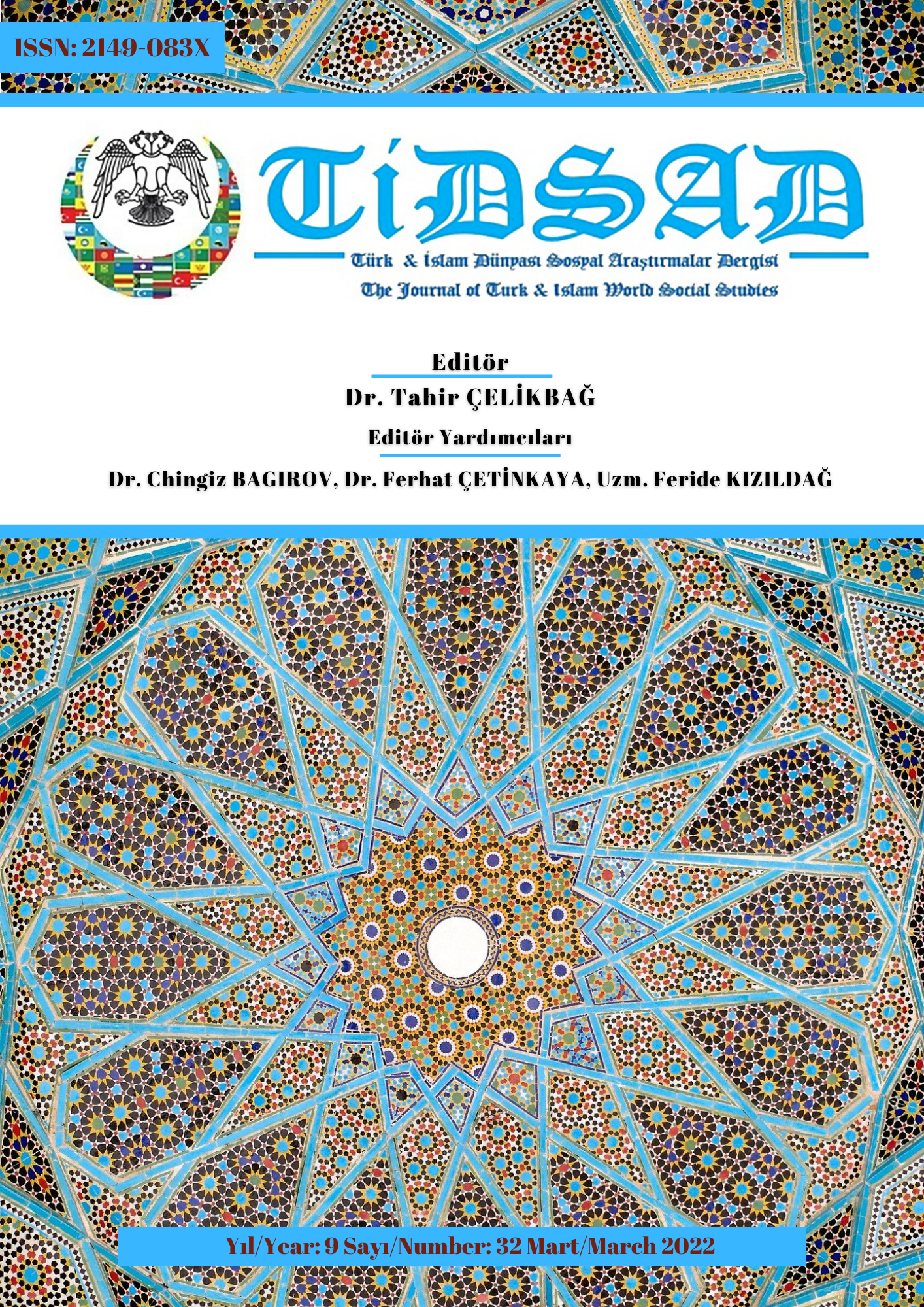Author :
Abstract
Salgınlar tarihi, insanlık tarihi kadar uzun bir geçmişe sahiptir. İnsan-çevre ilişkisinde, her bir aşama farklı türlerde ve boyutlarda salgın hastalıkları beraberinde getirmiştir. Tarım aşamasından yeni coğrafyaların keşfine, sanayileşme döneminden günümüze dünyanın pek çok noktasında insanlık salgınlarla birlikte yaşamış, onlara karşı mücadele içerisinde olmuştur. Her bir salgın da kendi bağlamı ekseninde çeşitli sonuçlar ortaya çıkarmıştır. Bu çalışma, 21. yüzyılın ilk çeyreğindeki Covid-19 salgını ile Avrupa tarihindeki “veba” söyleminin süreçler ve sonuçlar itibariyle bir karşılaştırmasını yapmak amacını taşımıştır. Bu karşılaştırmada ise Avrupa tarihindeki iki büyük vebanın (Kara Ölüm ve Büyük Londra Vebası) “Decameron” ve “Veba Yılı Günlüğü”ndeki yansımaları ile Covid-19’un günümüz Avrupa’sındaki yansımaları arasındaki bağıntıların analiz edilmesi hedeflenmektedir.
Keywords
Abstract
The history of pandemics has a history as long as the history of humanity. Each stage has brought pandemics of different types and scopes in the human-environment relationships. People from different places in the world have experienced pandemics and struggled against them from the agricultural stage to the discovery of new lands, from the industrialization period to the present. Each pandemic has brought along its various consequences. The aim of the present study is to make a comparison of the Covid-19 pandemic in the first quarter of the 21st century and the "plague" discourse in European history in terms of processes and results. In this comparative study, the aim is to analyze the correlations between the reflections of the two great plagues in European history (Black Death and Great Plague of London) in the “The Decameron” and “A Journal of the Plague Year” and the reflections of Covid-19 in today's Europe.
Keywords
- Akdoğan, M., Günay Atalı, A., Say, B., Gündoğan Gür, N. (2020). Avrupa Birliği’nin covid-19 yönetimi. Ekonomi, Politika & Finans Araştırmaları Dergisi, 5(Özel Sayı), 32-58.
- Avrupa başkentlerinde Covid-19 önlemleri protesto edildi; Hollanda’da 40 kişi tutuklandı (2021, 21 Kasım). https://tr.euronews.com/2021/11/21/avrupa-baskentlerindecovid-19-onlemleri-protesto-edildi-hollanda-da-40-kisi-tutukland, (Erişim: 08.02.2022).
- Boccaccio, G. (2020). Decameron. (Çev.: N. Yeni). Alfa Basım Yayım Dağıtım.
- Byrne, J. P. (2006). Daily life During the black death. Greenwood Press.
- Camus, A. (2020). Veba. (Çev.: N. Tanyolaç Öztokat). Can Yayınları.
- Carvalho, A. (2021). Covid-19 the wrath of God. Blurb.
- Crawford, D. H. (2019). Ölümcül yakınlıklar, mikroplar tarihimizi nasıl şekillendirdi?. (Çev.: G. Koca). Metis Yayınları.
- Defoe, D. (2021). Veba yılı günlüğü. (Çev.: İ. Kantemir). Türkiye İş Bankası Kültür Yayınları.
- Deming, D. (2012). Science and technology in world history, the black death, the raneissance, the reformation and the scientific revolution. McFarland & Company, Inc. Publishers.
- Derman, G. S. (2021, 15 Şubat). Kovid-19 aşısında rekabet kızışırken küresel eşitsizlik derin- leşiyor. https://www.aa.com.tr/tr/analiz/kovid-19-asisinda-rekabet-kizisirkenkuresel-esitsizlik-derinlesiyor/2145146, (Erişim: 08.02.2022).
- Genç, Ö. (2011). Kara ölüm: 1348 veba salgını ve ortaçağ Avrupa’sına etkileri. Tarih Okulu, X, 123-150.
- Harari, Y. N. (2017). Homo deus, yarının kısa bir tarihi. (Çev.: P. N. Taneli). Kolektif.
- Horrox, R. (1994). The black death. Manchester Univeristy Press.
- Karaimamoğlu, T. (2021). Ortaçağ Avrupa’sında salgın hastalıklar. Selenge Yayınları.
- Karaimamoğlu, T. ve Gümüş, T. T. (2020). Veba ile başlayan değişim: kara ölüm’den sonra Büyük Britanya’da değişen gündelik yaşam. SEFAD, (44), 509-526.
- Kılıç, O. (2020). Tarihte küresel salgın hastalıklar ve toplum hayatına etkileri. İçinde Şeker, M., Özer, A., Korkut, C. (ed.). Küresel salgının anatomisi insan ve toplumun geleceği (ss. 13-53). TÜBA Bilimler Akademisi.
- London, J. (2021). Kızıl veba. (Çev.: L. Cinemre). Türkiye İş Bankası Kültür Yayınları.
- Londra’daki büyük veba salgını’nın nedeni kesinleştirildi (2016, 9 Eylül). https://www.bbc.com/turkce/haberler-37305732, (Erişim: 07.02.2022).
- Lord, E. (2014). The great plague a people’s history. New Haven and London: Yale Univer- sity Press.
- Martin, S. (2011). Kara ölüm orta çağ’da veba. (Çev.: C. Atay). Kalkedon Yayıncılık.
- Moote, A. L. ve Moote, D. C. (2004). The great plauge the history of London’s most deadly year. The John Hopkins Universty Press.
- Nikiforuk, A. (2020). Mahşerin dördüncü atlısı. (Çev.: S. Erkanlı). İletişim Yayınları.
- Ökten Sipahioğlu, B. (2021). AB’nin kovid-19 mücadelesi ve Avrupa bütünleşmesinin gelece- ği. ATAUM Blog, http://ataum.ankara.edu.tr/2021/01/07/blog-yazi-1/ (Erişim:
- Parıldar, H. (2020). Tarihte bulaşıcı hastalık salgınları. Tepecik Eğitim ve Araştırma Hasta- nesi Dergisi, 30, 19-26.
- Polat, C. (2020). Covid-19 pandemisi: genel bir bakış. ANKEM, 34(1), 25-31.
- Sherman, I. W. (2020). Dünyamızı değiştiren on hastalık. (Çev.: E. Tümbay ve M. Küçüker). Türkiye İş Bankası Kültür Yayınları.
- Snowden, F. M. (2019). Epidemics and society from the black death to the present. Yale Uni- versity Press.
- Tapısız, Ö. L. ve Kıykaç Altınbaş, Ş. (2020). Mikroorganizmalar mavi gezegende bizden çok önce vardı: pandemiler tarihi. Türk Kadın Sağlığı ve Neonatoloji Dergisi, 2(2), 5369.
- Ülgen, P. (2020). Orta çağ Avrupa tarihi. Yeditepe Yayınevi.
- Ülgen, P. (2017). Orta çağ Avrupa’sının ölümle dansı. Arkeoloji ve Sanat Yayınları.





